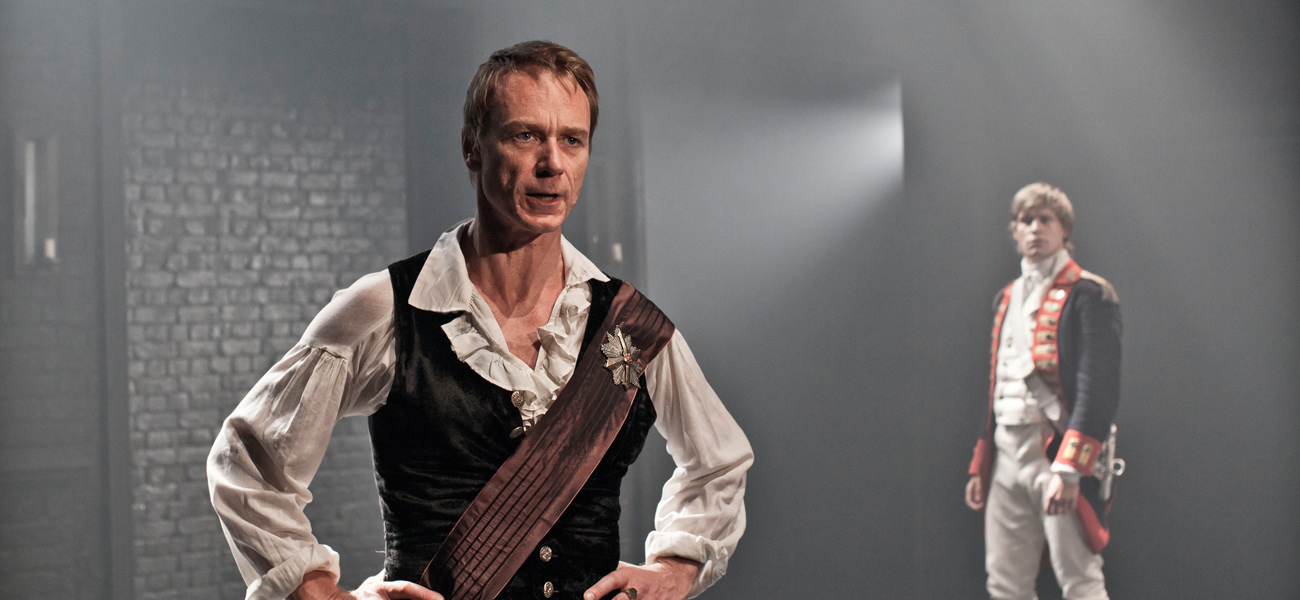Luise Miller, Donmar Warehouse
reviewed for The Spectator, 20 June 2011

Something is rotten in the state of Württemberg. Well, not quite Württemberg, because the young Frederich Schiller didn’t quite dare to express directly his criticisms of his first patron, Karl Eugen, Duke of Württemberg. Instead, he set this searing attack on whoring, machinating despots in an unnamed, ‘fictional’ German principality.
The result is a drama of sweeping scope and universalist aspirations, but one that can’t hide the deeply personal anger of a young writer confronted with the world’s corruption. In Michael Grandage’s deftly handled production at the Donmar Warehouse, Luise Miller is gripping and beguiling, thanks to translator Mike Poulton’s mellow touch and an ensemble of consistently superb performances.
Much of the plot’s urgency rests on the performance of Ben Daniels as the Machiavellian Chancellor, leading statesman of the court, who discovers that his well-bred son Ferdinand has pledged himself to a musician’s daughter, Luise Miller. Luise is not only a commoner but – worse! – distressingly morally principled. The Chancellor has more worldly plans for his only son, and is determined to drive them apart. Daniels has long proved his versatility as an actor, convincingly leading a range of productions as diverse as the BBC’s Cutting It and Katie Mitchell’s uncompromising staging of Euripides’s Iphegenia at Aulis.
Here, again, he turns in a performance of unrelenting intensity, so charismatic that one ends up half-tempted to root for the villain. He’s matched by Alex Kingston in a heart-stopping performance as the Duke’s mistress. Kingston comes into her own with a magnificent lament for the limited options available to impoverished noblewomen, although Schiller, displaying the characteristic Catholic sympathies of his attitude to English history, creates a tragic lineage for her that is entirely fictional.
We find ourselves wishing she was actually on stage for more than her two set-piece scenes, although she’s sometimes handicapped by an inability to physically throw herself into her emotional rages, a slight awkwardness of the limbs and tendency towards repetition of gesture that seems to come from years of television close-ups.
But even amid this cluster of talent, it’s Paul Higgins who turns in the most impressive performance. He is absolutely enthralling as Luise’s frightened father, the sensitive court musician determined to protect his daughter in the face of more powerful men. He was always watchable as abrasive press officer, Jamie, in The Thick of It and In the Loop, so it’s wonderful to see him relish an insult on the scale of: ‘You civil-servile, rat-faced, write-scribbling pox-blister!’
But, under the surface, this is a radically different character: we find ourselves watching for the softness under the gritty shell, the gentility and complex pride of a non-violent man in a violent world.
Beside him, Felicity Jones captures the determined innocence of Luise, although one sometimes wishes she was a bit less of a mask. Max Bennett has no such problem as her hot-headed lover, Ferdinand, a man who wears his emotions on his sleeve, who claims to care not a jot for public perception but then immediately sets his life on ‘name’ and ‘honour’, and one who knows his Shakespeare well enough to quote Cymbeline but doesn’t seem to realize that he’s actually in Othello.
And therein lies the play’s core problem. The first act is engrossing in the pace of its twists, but when the second act takes a lurch into darker stuff, it requires a credulity on the part of the key players that seems almost inconceivable. It also rests upon Luise’s devotion to an element of Catholic ritual that seems obstinately superstitious by the standards of most modern Catholics – another reminder, perhaps, of the need to understand our past in order to fully appreciate its legacy.
Fortunately, the intimacy of Grandage’s staging humanizes even the most grandiose of the young Schiller’s set-pieces, while Poulton’s translation distills the artificial quality of Schiller’s rhetoric into a delicate, sparkling style (although the constant cries of ‘You will lose everything!’ can’t help but be reminiscent of Lord Voldermort in his most excessive Warner Bros incarnations). Between them, Grandage and Poulton siphon off the play’s melodramatic excesses, leaving us instead with thrilling chamber opera.






